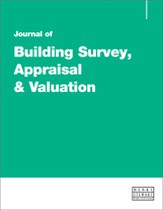Impact of the presence of bats on the development and maintenance of property
Abstract
This paper focuses upon the impact of having bats in buildings that are occupied, in need of repair, or proposed for development. The nature of bats is established, and why, due to declining numbers, they are protected by UK statute. The directives and penal nature of that statute, and the availability of associated government guidance documents, are outlined. The presence of target buildings favoured by roosting bats is established, along with a need to pre-emptively survey such buildings pre-planning application. Essential practice when surveying or working in a building that contains roosting bats is outlined, as well as the procedure required prior to undertaking any works that might have an impact upon a bat roost. The principles of bat and habitat licensing are explored, as are the requirements for compensating for, or mitigating any changes or losses to habitat. Final reference is made to guidance publications that assist the property owner to develop their building legally.
The full article is available to subscribers to the journal.
Author's Biography
Simon Mclean is a Programme Director for Building Surveying at University of Salford, UK.
Citation
Mclean, Simon (2012, October 1). Impact of the presence of bats on the development and maintenance of property. In the Journal of Building Survey, Appraisal & Valuation, Volume 1, Issue 3. https://doi.org/10.69554/IQLR3321.Publications LLP
